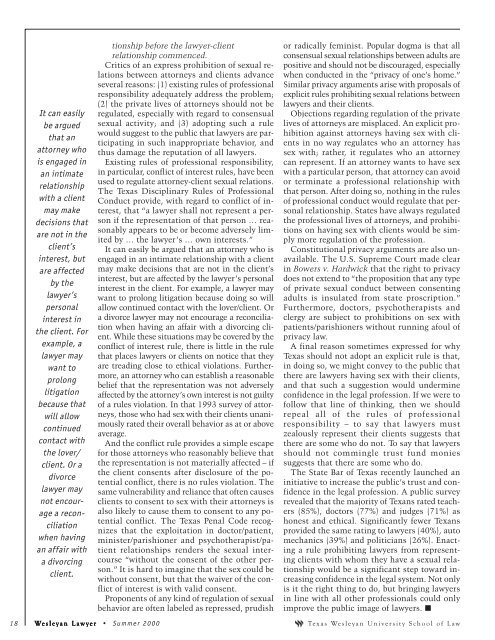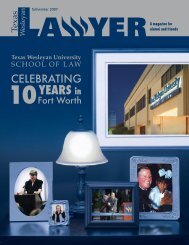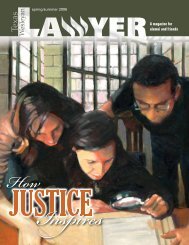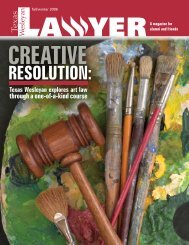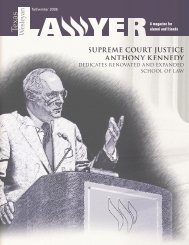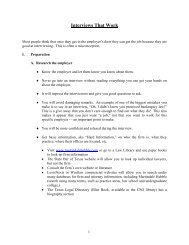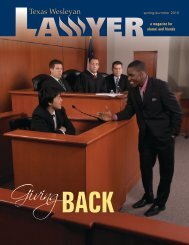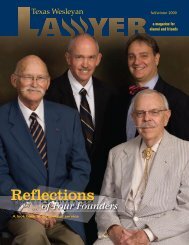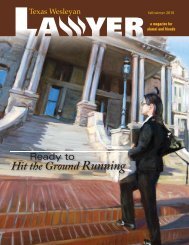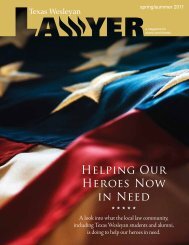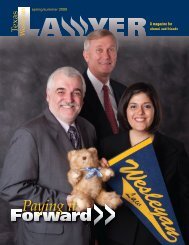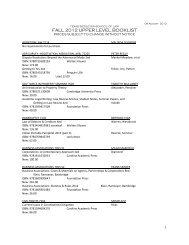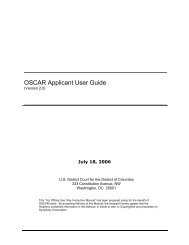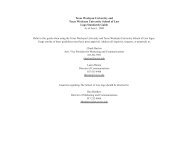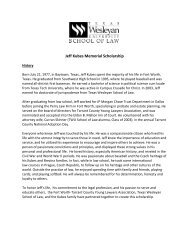21903 TWLS summer2000 - Texas Wesleyan School of Law - Texas ...
21903 TWLS summer2000 - Texas Wesleyan School of Law - Texas ...
21903 TWLS summer2000 - Texas Wesleyan School of Law - Texas ...
Create successful ePaper yourself
Turn your PDF publications into a flip-book with our unique Google optimized e-Paper software.
It can easily<br />
be argued<br />
that an<br />
attorney who<br />
is engaged in<br />
an intimate<br />
relationship<br />
with a client<br />
may make<br />
decisions that<br />
are not in the<br />
client’s<br />
interest, but<br />
are affected<br />
by the<br />
lawyer’s<br />
personal<br />
interest in<br />
the client. For<br />
example, a<br />
lawyer may<br />
want to<br />
prolong<br />
litigation<br />
because that<br />
will allow<br />
continued<br />
contact with<br />
the lover/<br />
client. Or a<br />
divorce<br />
lawyer may<br />
not encourage<br />
a reconciliation<br />
when having<br />
an affair with<br />
a divorcing<br />
client.<br />
tionship before the lawyer-client<br />
relationship commenced.<br />
Critics <strong>of</strong> an express prohibition <strong>of</strong> sexual relations<br />
between attorneys and clients advance<br />
several reasons: (1) existing rules <strong>of</strong> pr<strong>of</strong>essional<br />
responsibility adequately address the problem;<br />
(2) the private lives <strong>of</strong> attorneys should not be<br />
regulated, especially with regard to consensual<br />
sexual activity; and (3) adopting such a rule<br />
would suggest to the public that lawyers are participating<br />
in such inappropriate behavior, and<br />
thus damage the reputation <strong>of</strong> all lawyers.<br />
Existing rules <strong>of</strong> pr<strong>of</strong>essional responsibility,<br />
in particular, conflict <strong>of</strong> interest rules, have been<br />
used to regulate attorney-client sexual relations.<br />
The <strong>Texas</strong> Disciplinary Rules <strong>of</strong> Pr<strong>of</strong>essional<br />
Conduct provide, with regard to conflict <strong>of</strong> interest,<br />
that “a lawyer shall not represent a person<br />
if the representation <strong>of</strong> that person … reasonably<br />
appears to be or become adversely limited<br />
by … the lawyer’s … own interests.”<br />
It can easily be argued that an attorney who is<br />
engaged in an intimate relationship with a client<br />
may make decisions that are not in the client’s<br />
interest, but are affected by the lawyer’s personal<br />
interest in the client. For example, a lawyer may<br />
want to prolong litigation because doing so will<br />
allow continued contact with the lover/client. Or<br />
a divorce lawyer may not encourage a reconciliation<br />
when having an affair with a divorcing client.<br />
While these situations may be covered by the<br />
conflict <strong>of</strong> interest rule, there is little in the rule<br />
that places lawyers or clients on notice that they<br />
are treading close to ethical violations. Furthermore,<br />
an attorney who can establish a reasonable<br />
belief that the representation was not adversely<br />
affected by the attorney’s own interest is not guilty<br />
<strong>of</strong> a rules violation. In that 1993 survey <strong>of</strong> attorneys,<br />
those who had sex with their clients unanimously<br />
rated their overall behavior as at or above<br />
average.<br />
And the conflict rule provides a simple escape<br />
for those attorneys who reasonably believe that<br />
the representation is not materially affected – if<br />
the client consents after disclosure <strong>of</strong> the potential<br />
conflict, there is no rules violation. The<br />
same vulnerability and reliance that <strong>of</strong>ten causes<br />
clients to consent to sex with their attorneys is<br />
also likely to cause them to consent to any potential<br />
conflict. The <strong>Texas</strong> Penal Code recognizes<br />
that the exploitation in doctor/patient,<br />
minister/parishioner and psychotherapist/patient<br />
relationships renders the sexual intercourse<br />
“without the consent <strong>of</strong> the other person.”<br />
It is hard to imagine that the sex could be<br />
without consent, but that the waiver <strong>of</strong> the conflict<br />
<strong>of</strong> interest is with valid consent.<br />
Proponents <strong>of</strong> any kind <strong>of</strong> regulation <strong>of</strong> sexual<br />
behavior are <strong>of</strong>ten labeled as repressed, prudish<br />
or radically feminist. Popular dogma is that all<br />
consensual sexual relationships between adults are<br />
positive and should not be discouraged, especially<br />
when conducted in the “privacy <strong>of</strong> one’s home.”<br />
Similar privacy arguments arise with proposals <strong>of</strong><br />
explicit rules prohibiting sexual relations between<br />
lawyers and their clients.<br />
Objections regarding regulation <strong>of</strong> the private<br />
lives <strong>of</strong> attorneys are misplaced. An explicit prohibition<br />
against attorneys having sex with clients<br />
in no way regulates who an attorney has<br />
sex with; rather, it regulates who an attorney<br />
can represent. If an attorney wants to have sex<br />
with a particular person, that attorney can avoid<br />
or terminate a pr<strong>of</strong>essional relationship with<br />
that person. After doing so, nothing in the rules<br />
<strong>of</strong> pr<strong>of</strong>essional conduct would regulate that personal<br />
relationship. States have always regulated<br />
the pr<strong>of</strong>essional lives <strong>of</strong> attorneys, and prohibitions<br />
on having sex with clients would be simply<br />
more regulation <strong>of</strong> the pr<strong>of</strong>ession.<br />
Constitutional privacy arguments are also unavailable.<br />
The U.S. Supreme Court made clear<br />
in Bowers v. Hardwick that the right to privacy<br />
does not extend to “the proposition that any type<br />
<strong>of</strong> private sexual conduct between consenting<br />
adults is insulated from state proscription.”<br />
Furthermore, doctors, psychotherapists and<br />
clergy are subject to prohibitions on sex with<br />
patients/parishioners without running afoul <strong>of</strong><br />
privacy law.<br />
A final reason sometimes expressed for why<br />
<strong>Texas</strong> should not adopt an explicit rule is that,<br />
in doing so, we might convey to the public that<br />
there are lawyers having sex with their clients,<br />
and that such a suggestion would undermine<br />
confidence in the legal pr<strong>of</strong>ession. If we were to<br />
follow that line <strong>of</strong> thinking, then we should<br />
repeal all <strong>of</strong> the rules <strong>of</strong> pr<strong>of</strong>essional<br />
responsibility – to say that lawyers must<br />
zealously represent their clients suggests that<br />
there are some who do not. To say that lawyers<br />
should not commingle trust fund monies<br />
suggests that there are some who do.<br />
The State Bar <strong>of</strong> <strong>Texas</strong> recently launched an<br />
initiative to increase the public’s trust and confidence<br />
in the legal pr<strong>of</strong>ession. A public survey<br />
revealed that the majority <strong>of</strong> Texans rated teachers<br />
(85%), doctors (77%) and judges (71%) as<br />
honest and ethical. Significantly fewer Texans<br />
provided the same rating to lawyers (40%), auto<br />
mechanics (39%) and politicians (26%). Enacting<br />
a rule prohibiting lawyers from representing<br />
clients with whom they have a sexual relationship<br />
would be a significant step toward increasing<br />
confidence in the legal system. Not only<br />
is it the right thing to do, but bringing lawyers<br />
in line with all other pr<strong>of</strong>essionals could only<br />
improve the public image <strong>of</strong> lawyers. ■<br />
18 Wesle esle esley esle an an La <strong>Law</strong>y La wy wyer wy er • Summer 2000 <strong>Texas</strong> <strong>Wesleyan</strong> University <strong>School</strong> <strong>of</strong> <strong>Law</strong>


